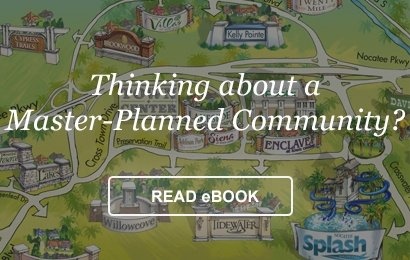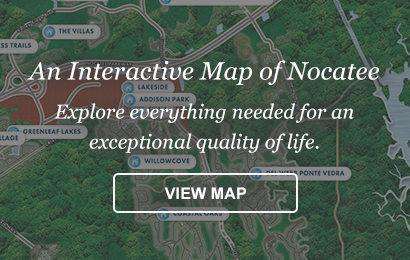When people first consider buying a home in a master-planned community, it’s only natural that they should focus on considerations such as the community’s location, amenities and available home styles.
But before they sign on the dotted line, experts say, buyers should consider another key factor: the community’s developer. Charged with creating and executing the entire vision for a master-planned community, it’s the developer who often spells the difference between a vibrant, thriving community and a languishing project that fails to meet residents’ expectations.
“It’s really no different from choosing your plumber or electrician,” says Roger O’Steen, founder of The PARC Group, the master-developer of behind Nocatee. “You want to know: Is their work going to be good? Am I going to be able to trust them? And can I depend on them to stay in business?” Here are 4 things to look for in a master developer.
1.) Expertise: Because master-planned communities (MPCs) operate on a much-larger scale than typical subdivisions, a developer must have experience in bringing such projects to successful fruition. In addition to a thorough knowledge of the industry, MPC developers need to know what homeowners want in terms of amenities, street design and home styles.
2.) Funding: Because master-planned communities can take decades to go from the drawing board to full completion, it’s likely that an MPC developer will experience several up-and-down financial cycles during that time. As a result, observers say, it’s imperative that master-planned community developers have the capital needed to weather economic downturns and keep the project moving forward.
These first two considerations go hand in hand, O’Steen says. “You can have a developer who is well-capitalized, but they don’t have the experience to execute a project on this scale,” he says. “Likewise, you can have a developer with lots of experience, but they don’t have the financing needed to sustain the project through good economic times and bad.
“You really need a developer who has both the expertise and the capital needed to turn the vision into a reality.”
Buyers may also want to consider doing some research to see if the developer has had any prior financial problems that might indicate an inability to complete a master-planned community.
3.) Track Record: How long has the developer been in business? What other master-planned communities has the company completed? Buyers may want to consider visiting some of a developer’s other projects to see how they have fared over time: Are they fully built out? Is the community well maintained?
If a community visit isn’t possible, buyers should go online and visit other communities’ websites to get a sense of how well the developer has executed previous projects.
4.) Credibility: Perhaps the most important criteria for selecting a master-planned community developer, credibility is earned when MPC developers live up to the promises they set forth in a community’s earliest stages.
“With Nocatee, we established a community development plan from the very beginning -- and today, every commitment that we promised to make has been fulfilled,” O’Steen says. “We continue to improve the community every day, monitoring residents’ needs and requests and constantly updating and evaluating our efforts so that we can keep moving forward.”





